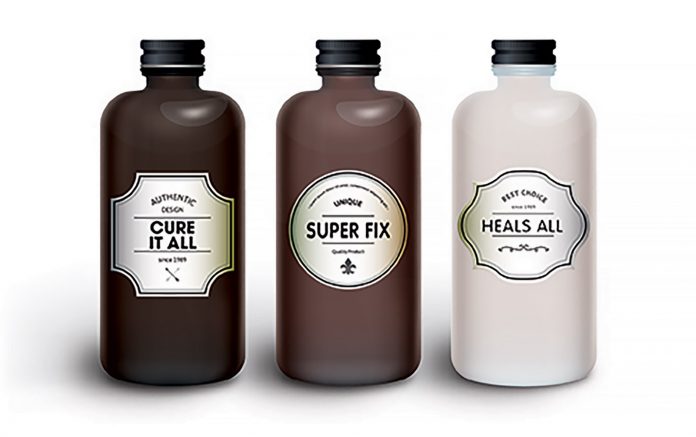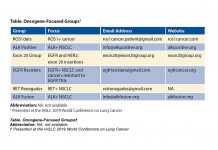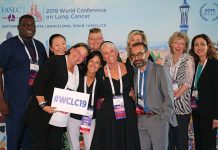By Leah Lawrence
Posted: December 11, 2019
Many patients newly diagnosed with lung cancer have difficulty navigating the world of cancer when unexpectedly and unwillingly thrust into it. In addition to understanding their diagnosis, prognosis, and treatment options, patients are also bombarded with an abundance of information on the internet, direct-to-consumer advertising of new cancer therapies, and headlines in the media touting miracle cures.
“It can be overwhelming,” said Janet Freeman-Daily, a lung cancer survivor and patient advocate.
Ms. Freeman-Daily was particularly taken aback in January 2019, when other patients with lung cancer began contacting her after seeing a headline written by the Jerusalem Post that read “A Cure For Cancer? Israeli Scientists May Have Found One.”1
In the article, the chief executive officer of Accelerated Evolution Biotechnologies Ltd. said that, based on the results of a recent study, the company would be able to offer a “complete cure for cancer” within a year’s time. However, only by scrolling to the last paragraph of the article could a reader see that the company had just completed a mouse experiment testing the new approach.
“There are so many people desperate for hope that they may see a headline talking about a ‘cure’ without reading the body of the article, and share it on social media,” Ms. Freeman-Daily said. “More people see it and do the same thing. It can be dangerous.”
The seductive headline teasing a cure-all for cancer led to myriad other news and social media outlets picking up the story. The timing of this was particularly tragic because in the week prior to the article’s publication, hundreds of journalism professionals, including those specializing in health news, were laid off,2 Ms. Freeman-Daily noted.
“I would like to see the press become much more aware of the impact they can have on people,” Ms. Freeman-Daily added. “They should not be using the word ‘cure’ in a headline or the article when it is not yet proven.”
Another recent headline read, “Terminally-Ill British Mother, 40, Who Kept Her Lung Cancer Secret From Her Young Daughter Shocks Medics After Tumour Shrinks by 75% Following Alternative Treatment in Mexico.”3 In the article, the woman credits the alternative therapies for shrinking her tumor. These included treatments focused on heat, light, and laser therapies, according to the article, including hyperbaric oxygen therapy, coffee enemas, saunas, and infrared lamp therapy. Only by scrolling far down in the story is it revealed that she had been placed on targeted therapy with alectinib prior to traveling to Mexico.
“The media plays a huge role in responsibly reporting these stories because any person interviewing her should point out that she was also on conventional therapy and at least ask her if she thinks that might have anything to do with her impressive results,” said Corey J. Langer, MD, director of Thoracic Oncology and professor of Medicine at Perelman Center for Advanced Medicine, University of Pennsylvania, and Editor of the IASLC Lung Cancer News.
Closer to Home
Dr. Langer said that managing patient expectations can also be difficult when discussing direct-to-consumer advertising of evidence-based treatments that patients have seen on television or in magazines.
“Commercials for some of these newer drugs, particularly marketing for Merck’s Keytruda and Bristol Myers Squibb’s Opdivo, give patients a lot of hope,” Dr. Langer said. “They often depict actors as patients who look a lot happier and healthier than a lot of my patients.”
According to Dr. Langer, these commercials sometimes create unrealistic expectations with patients or imply that these drugs are destined to work better than other approaches.
“These commercials sometimes obligate me to bring patients down from an emotional high, and that is never good,” he said. “It can create an adversarial relationship between the patient and the caregiver.”
In some cases, Dr. Langer has even had patients come in begging for these drugs without even realizing that they are already being treated with them.
“Patients are getting bombarded, and it is hard for them to discern what is bonafide from what is hyped,” Dr. Langer said. “Giving a balanced perspective on some of this research doesn’t make good TV, but it is what is necessary.”
Where to Turn
To help patients weed through all of the available information on lung cancer, Dr. Langer often points them to patient advocacy groups or reliable online sources of information.
Ms. Freeman-Daily will oft en suggest that patients visit LCSMChat.com to find sources for trusted lung cancer information.4
When discussing the hype of some media articles, Ms. Freeman-Daily said that she has been accused of “trying to kill hope,” but wanted to clarify that killing hope is not her intention at all.
“I want to help patients with stage IV lung cancer understand that there is no cure and that no one therapy is going to work for everybody,” Ms. Freeman-Daily explained. “I encourage patients to work with their physicians to choose the treatment that is backed by evidence and that will provide the best possible outcome.” ✦
References:
1. Jaffe-Hoff man M. A Cure For Cancer? Israeli Scientists May Have Found One. The Jerusalem Post. jpost.com/HEALTH-SCIENCE/A-cure-for-cancer-Israeli-scientists-say-they-think-they-found-one-578939. Published January 28, 2019. Accessed April 20, 2019.
2. Allsop J. A Brutal Week for American Journalism. Columbia Journalism Review. cjr.org/the_media_ today/layoffs_huffpost_buzzfeed_gannett.php. Published January 28, 2019. Accessed April 20, 2019.
3. Nikolic I. Terminally-Ill British Mother, 40, Who Kept Her Lung Cancer Secret From Her Young Daughter Shocks Medics After Tumour Shrinks by 75% Following Alternative Treatment in Mexico. DailyMail.com. dailymail.co.uk/news/article-6842297/Terminally-ill-British-mother-40-shocks-medics-tumour-shrinks-75.html. Published March 23, 2019. Accessed April 20, 2019.
4. LCSMChat. Where to Find Trusted Lung Cancer Info. lcsmchat.com/lung-cancer-resources/where-to-find-trusted-online-info-about-lung-cancer. Accessed April 20, 2019.











